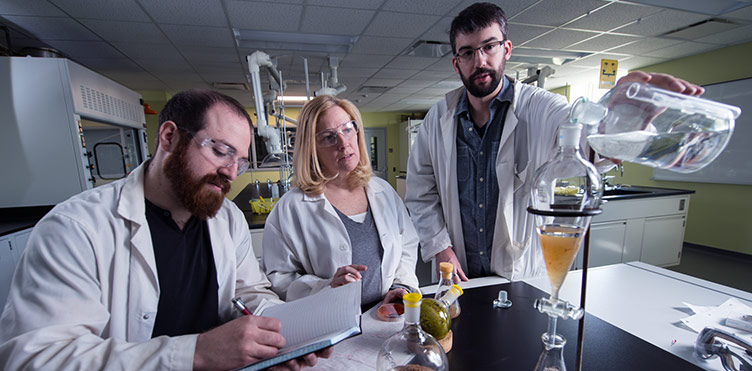Graduate program

Biology programs
We offer our graduate program in biology at both the masters and doctoral levels. Research areas include:
Marine biology
- Ecology and conservation of marine birds
- Roles of dispersal and behaviour in regulating marine bird populations
- Ecophysiology of fish
- Evolutionary ecology of coastal marine invertebrates
- Fish ecology, evolution and behaviour
- Fisheries ecology (invertebrate)
- Fisheries conservation genomics
- Impacts of harvesting, management and changing environments on fishes
- Causal inference in marine ecology and conservation
Environmental biology
- Effects of multiple stressors on aquatic systems
- Effects of habitat loss and degradation on populations, communities and ecosystems
- Environmental physiology of fishes
- Chemical contamination of aquatic food webs; aquatic toxicology
- Impacts of anthropogenic effects (low oxygen, effluents, elevated temperatures) on fish metabolism and swimming abilities.
Natural products chemistry
- Marine and terrestrial chemical ecology
- Endophytic fungi and their bioactive/antimicrobial properties
- Secondary metabolites and novel drug leads
Genomics
- Aquatic molecular ecology
- Ecological genomics
- Environmental DNA (eDNA) and metagenomics
- Fisheries conservation genomics
- Population and conservation genomics
- Genetic basis of adaptation
Cancer research
Pre-clinical and clinical studies of novel therapies and biomarkers in:
- Multiple myeloma
- Lymphoma
- Lung cancer
How to apply
Finding a supervisor
1. Identify a potential supervisor
Meet our current faculty and discover who has primary research interests similar to yours.
2. Write a basic outline of your project
This outline will serve as the basis of discussion with your potential supervisor. Read the guidelines for graduate students to understand what we expect from Graduate Students.
3. Contact your potential supervisor
Once you have a general idea for a project, contact your potential supervisor to discuss your ideas. You will address important questions such as:
- Is my potential supervisor interested in the project? Does my project match their current research activities?
- Do they have the resources to accommodate me in their research space and in their budget?
- Can they accommodate me within their existing teaching and supervision schedules?
Submit your application online and remember to identify your potential supervisor. The School of Graduate Studies has information on general regulations, tuition and more.
Starting and continuing students
Before your first term
Your letter of acceptance contains your personal identification number to register online. Contact Susan Wilson for assistance.
Meet your supervisor
The Department of Biology offers a reciprocal agreement with important topics to be discussed with your supervisor in the first month. Read the guidelines and tips to ensure you know what we expect from you.
Within your first month
Set up your supervisory committee: The supervisory committee consists of a minimum of three individuals, including a supervisor and is established by the supervisor in consultation with the graduate student and the proposed committee members.
Meet with your committee: Complete the program of study form which outlines the courses you will take. Submit this form with the reciprocal agreement to the Biology GAU secretary, Victoria Kindred.
Don’t forget to plan ahead if you want to complete your MSc in less than two years.
In your first year
M.Sc. students: Begin your proposal presentation
Ph.D. students: Begin your proposal defence. This defence is a combination of the proposal and qualifying comprehensive examinations held at other institutions.
Orientation: Every September, the GAU gives an orientation which includes:
- an informal overview of the program
- a chance to meet others in the GAU
- a questions session
After your first year
The School of Graduate Studies requires you to submit a progress report at least once every year.
You must meet with your committee at least twice annually. At the conclusion of every meeting, your committee will complete a progress form, which must be signed and returned to the Biology GAU secretary.
Training, certifications and diplomas
It’s your responsibility to obtain any certifications required to conduct your research and to discuss this with your supervisor as soon as possible.
Finishing students
See the School of Graduate Studies for the guidelines to prepare and submit your thesis before you begin writing your thesis.
Submit your thesis
Work with your supervisor until your thesis draft is ready for review by your supervisory committee. You need to send this form, copies for the supervisory committee and a copy for the DoGS.
Your supervisory committee will review and suggest or require changes. This may take more than one iteration.
The Director of Graduate Studies will verify potential examiners’ availabilities to serve on the examining committee.
You will provide the required number of hard copies which will then be distributed by the Director of Graduate Studies.
The committee will return a decision on the thesis’ defence within three weeks. The DoGS will schedule a thesis defence date, not less than a week later, in consultation with you and your committee.
Once you successfully defend your thesis, you will sign the sheaf of forms provided by the graduate secretary with your supervisor
You must submit a vita along with your thesis, with the following layout:
- your full name
- the universities you attended, with dates and the degrees you obtained
- publications
- conference presentations
Submission of completed thesis copies
You must submit the signed completion forms and two paper copies of your thesis to the School of Graduate Studies.
Contact a thesis publishing company to have personal copies bound.
